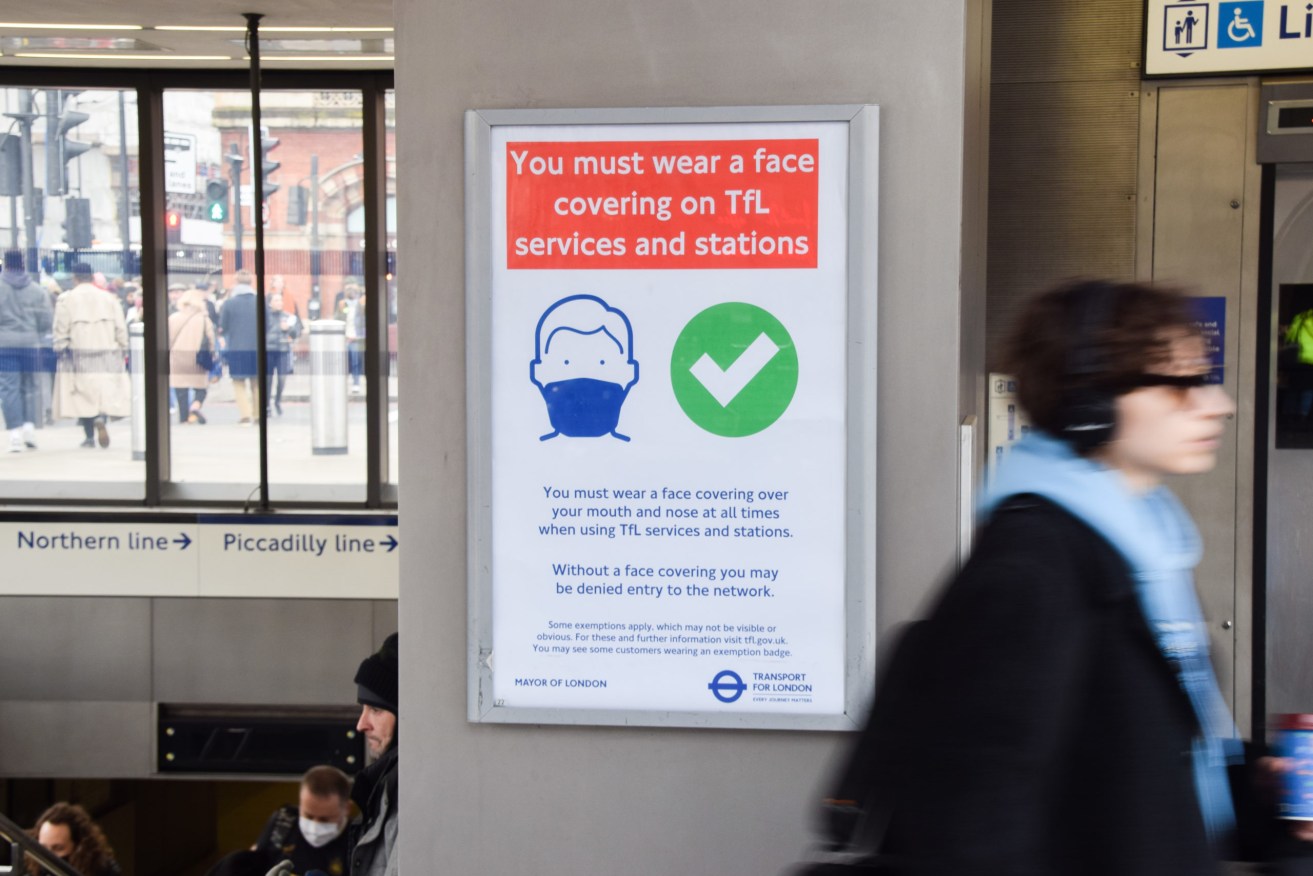Out of Africa? Why source of rogue virus may not be where we thought
As the world waits and watches for the rogue Omicron virus strain to show its hand, evidence has emerged that its origins may have been in Europe, rather than Africa. Cindy Wockner investigates

Coronavirus restrictions have been reintroduced in the UK, with mandatory face masks in shops and on public transport, to help stop the spread of the new Omicron variant. (Photo by Vuk Valcic / SOPA Images/Sipa USA)
One week ago the world first learned about the emergence of a new COVID-19 variant That was November 24, when South African authorities reported to the World Health Organisation on the discovery of a new virus strain.
But as countries around the world are now uncovering more and more cases of the new Omicron variant, there is evidence the virus appears to have been circulating in Europe before it was detected in South Africa.
US authorities say there are now almost 250 cases of Omicron in 20 different countries and that in South Africa cases are rising rapidly.
Countries which, by Wednesday, were reporting cases include Australia, where there are seven infections, Britain, Canada, Israel and at least 11 European Union nations.
New South Wales announced a sixth case on Wednesday morning – a man in his 40s who flew into Sydney on the same flight from Doha as other cases. All cases are said to be showing only mild symptoms or are completely asymptomatic – something which has prompted cautious optimism from health authorities about the potential impacts of yet another strain.
The South African case was uncovered from samples taken in that country on November 9 and it now appears that a case, who flew into Belgium on November 11, was also carrying Omicron.
And Dutch authorities have now said that they have uncovered Omicron in samples taken from travellers on November 19 and 23, before the South African case was notified.
According to authorities around the world, here is what is known so far about the origins and spread of Omicron:
- Nov 9 – the first samples are taken for testing in South Africa;
- Nov 11 – A woman, unvaccinated, flew to Belgium from Egypt and tested positive to Omicron on November 22;
- Nov 19-23: The Dutch health institute reports finding Omicron in samples;
- Nov 20: A man who arrived on Reunion Island, in the Indian Ocean, and had travelled to Mozambique and stopped in South Africa, tested positive;
- Nov 24 – South Africa notifies the WHO of the discovery of the new strain;
- Nov 24 – Two cases arrived in Germany;
- Nov 25 – A man who arrived in Brazil from South Africa on November 23 tested positive along with his wife;
- Nov 26 – The WHO designated the variant B.1.1.529 a variant of concern, named Omicron, on the advice of WHO’s Technical Advisory Group on Virus Evolution;
- Nov 28-29 – Three cases arrived in the Canadian provinces of Ontario, Quebec and Alberta, the first case had arrived from Nigeria and the Netherlands.
- Nov 29 – The WHO, in a statement, said that the Omicron variant poses a “very high” global risk of infection which could have severe consequences in some areas.
On Tuesday, the WHO said in a statement that it was expected Omicron would be detected in an increasing number of countries as national authorities step up surveillance and sequencing activities.
“WHO is closely monitoring the spread of the Omicron variant and studies are ongoing to understand more about these mutations and their impact on transmissibility, virulence, diagnostics, therapeutics and vaccines,” the latest statement says.
The WHO says it remains unclear as to whether Omicron is more transmissible than previous variants, including Delta, although the number of people testing positive in South Africa has risen.
And it says it is not clear whether Omicron causes more severe disease but there is preliminary data of increasing hospitalisation rates in South Africa
“There is currently no information to suggest that symptoms associated with Omicron are different from those from other variants. Initial reported infections were among university students – younger individuals who tend to have more mild disease – but understanding the level of severity of the Omicron variant will take days to several weeks,” the WHO said in a statement. “All variants of COVID-19, including the Delta variant that is dominant worldwide, can cause severe disease or death, in particular for the most vulnerable people, and thus prevention is always key,” the WHO says.
Countries around the world have rushed to shut borders and tighten quarantine procedures for travellers and have stopped taking flights from Southern Africa.
Canberra has ordered a two-week pause on the planned reopening of borders to international students and other visa holders, which was to have occurred on Wednesday. And the Australian Technical Advisory Group on Immunisation is currently considering whether to speed up the timeframe for Australians to be given vaccine booster shots.
National Cabinet met late on Tuesday to discuss Australia’s response to the new threat.
Premier Annastacia Palaszczuk told State Parliament on Wednesday that the State had recorded no new local COVID-19 cases, one new interstate case and one new overseas case, both detected in hotel quarantine.
But she made no comment on the National Cabinet’s discussion about Omicron, saying she would leave that to the Federal authorities.
“Queensland’s cautious approach is the right approach,” she said of the State’s handling of the virus.
“No changes have been made to our roadmap. Queensland will continue to monitor developments and listen to advice,” Palaszczuk said.












